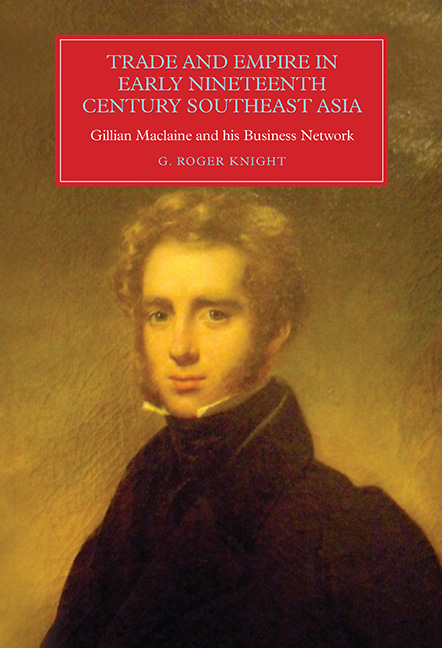 Trade and Empire in Early Nineteenth-Century Southeast Asia
Trade and Empire in Early Nineteenth-Century Southeast Asia Book contents
- Frontmatter
- Contents
- Acknowledgements
- Abbreviations
- Map of Maritime Asia: Trade and Empire, c. 1830
- Preface
- Map of South Central Java, c. 1830
- 1 Introduction: A Scots Émigré, Imperial Systems and Global Commodities
- 2 Maclaine’s ‘Apprenticeship’: The City of London and the Cotton Trade with Asia, 1816–20
- 3 A ‘Scotch Adventurer’: Batavia, Coffee and Colonial Wars, 1820–27
- 4 The Pivotal Years: ‘Maclaine Watson’, Treacherous Chains, Sickness and Debt, 1827–32
- 5 The Network Takes Shape: Connections, Business and Associates, 1832–40
- 6 Conclusion: Maclaine’s Legacy, Commodities and Trade on a Colonial ‘Periphery’, 1840–1964
- Bibliography
- Index
- Worlds of the East India Company
2 - Maclaine’s ‘Apprenticeship’: The City of London and the Cotton Trade with Asia, 1816–20
Published online by Cambridge University Press: 17 June 2021
- Frontmatter
- Contents
- Acknowledgements
- Abbreviations
- Map of Maritime Asia: Trade and Empire, c. 1830
- Preface
- Map of South Central Java, c. 1830
- 1 Introduction: A Scots Émigré, Imperial Systems and Global Commodities
- 2 Maclaine’s ‘Apprenticeship’: The City of London and the Cotton Trade with Asia, 1816–20
- 3 A ‘Scotch Adventurer’: Batavia, Coffee and Colonial Wars, 1820–27
- 4 The Pivotal Years: ‘Maclaine Watson’, Treacherous Chains, Sickness and Debt, 1827–32
- 5 The Network Takes Shape: Connections, Business and Associates, 1832–40
- 6 Conclusion: Maclaine’s Legacy, Commodities and Trade on a Colonial ‘Periphery’, 1840–1964
- Bibliography
- Index
- Worlds of the East India Company
Summary
I am happy to inform you that I am daily growing fonder of the mercantile profession. It suits my inclinations more than any line of life I can think of. I find myself now considerably more interested in the Business as I commence to understand it a little better.
By 1816 Gillian Maclaine, the man who went on to found Maclaine Watson, was in his eighteenth year. The elder child of an impoverished Highland laird, Allan Maclaine of Scallastle, he faced a common enough problem among those of his kind. The island of Mull, where his father had inherited a problematic claim to a small estate, together with the peninsula of Morvern on the adjacent mainland, was an economy and society in transition. Large-scale sheep farming was replacing crofter-rents and military service as the basis for the tenuous prosperity of the island's small gentry elite. This posed problems for young men like Maclaine. Several of his paternal uncles had served in the British army, and a well-deserved reputation for military valour, in tandem with a presumably suitably dashing manner in Regency London, had brought two of them the prize of a rich wife. But the war with Napoleon was over and for the younger generation there were no similar opportunities. In this sense, and disregarding personal proclivities, it was no accident that Maclaine's only sibling went into the Church and that his foremost cousin, Donald Maclaine of Lochbuie, followed him into business. Nor did Maclaine's own immediate family circumstances make his prospects any more promising.
His father had been declared insane in 1800, two years after Gillian's birth and was to spend the remainder of his long life (he died in 1842) in an asylum near Edinburgh. In his absence, Gillian and his brother Angus were brought up by their mother, Marjory Gregorson and her as yet unmarried brother, John Gregorson of Ardtornish. John Gregorson was a man of some substance, like his father before him taksman or bailiff and rent-collector for the Duke of Argyll in this part of the western Highlands.
- Type
- Chapter
- Information
- Trade and Empire in Early Nineteenth-Century Southeast AsiaGillian Maclaine and his Business Network, pp. 25 - 56Publisher: Boydell & BrewerPrint publication year: 2015


